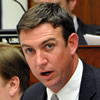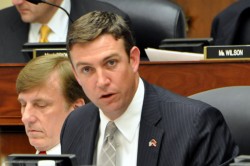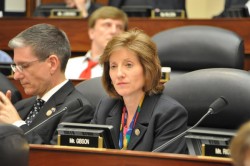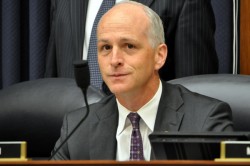National
House panel adopts anti-gay amendments in defense bill
Amendments reaffirm DOMA, could disrupt ‘Don’t Ask’ repeal


Rep. Duncan Hunter introduced an amendment that could disrupt 'Don't Ask' repeal (Blade photo by Michael Key)
A House defense committee approved on Wednesday a series of anti-gay amendments as part of major Pentagon budget legislation aimed at disrupting the process for repealing “Don’t Ask, Don’t Tell” and at demonstrating support for the Defense of Marriage Act.
The most high-profile amendment came from Rep. Duncan Hunter (R-Calif.), who introduced a measure that would expand the certification requirement needed for repeal to include input from the four military service chiefs. The Republican-controlled House Armed Services Committee voted 33-27 in favor of adopting the measure as part of the fiscal year 2012 defense authorization bill.
The vote in favor of the Hunter amendment was mostly along party lines, although Reps. Todd Platts (R-Pa.) and Chris Gibson (R-N.Y.) voted against the measure. Rep. Mike McIntyre (D-N.C.) was the sole Democrat to vote in favor of the measure.
The repeal legislation signed into law in December allows for repeal of “Don’t Ask, Don’t Tell” after 60 days pass following certification from the president, the defense secretary and the chair of the Joint Chiefs of Staff. Hunter’s amendment would expand the certification requirement to include input from the uniform chiefs of staff for the Army, Navy, Air Force and Marine Corps.
Hunter, a Marine Corps veteran of Iraq and Afghanistan, billed the amendment as a means to ensure the uniform military leaders — which he described “the ones that are actually responsible for the men and women under their care” — are able to express their opinion before moving forward with “Don’t Ask, Don’t Tell” repeal.
“Right now as it stands, the only folks that have to sign on to this are the president, who has never been to war or in ground combat, Adm. [Mike] Mullen, who, with all due respect to him, has never been to ground combat in Iraq or Afghanistan, and Secretary Gates, a political appointee, who is a very fine gentleman, but has never been in ground combat in Iraq or Afghanistan,” Hunter said. “I, and others in this room, have more combat experience than the people who would sign off on the repeal of ‘Don’t Ask, Don’t Tell.'”
Hunter emphasized his amendment would require the service chiefs to issue certification only based on their belief that “Don’t Ask, Don’t Tell” repeal wouldn’t harm morale and unit cohesion for combat arms units under their jurisdiction. According to the Pentagon survey published in November, these units are the most skeptical about whether open service would cause a disruption in the U.S. military.
Involving the military service chiefs in the “Don’t Ask, Don’t Tell” repeal certification process could disrupt or delay open service in the U.S. military because some uniform leaders of the military — notably Marine Corps Commandant Gen. James Amos — expressed opposition to passing repeal legislation last year. Amos has since said the Marine Corps would work to implement open service.
Despite the concerns that were expressed last year, each of the service chiefs testified in April that the process for enacting “Don’t Ask, Don’t Tell” repeal has been proceeding smoothly. Some service chiefs — including Chief of Naval Operations Adm. Gary Roughead — have said they oppose any effort to expand the certification requirement and they believe the defense secretary would adequately represent their views in the certification process.
Many Republican committee members voiced support for the Hunter amendment as they expressed opposition to implementing open service in the U.S. military.
Rep. Doug Lamborn (R-Colo.) said he supported the amendment because the president, the defense secretary and the chairman of the Joint Chiefs of Staff had already backed “Don’t Ask, Don’t Tell” repeal before Congress acted to end the military’s gay ban.
“I always felt the deck was stacked when the three people who were supposed to sign off on it, agreed to and had all been on record ahead of time saying what their preference was,” Lamborn said. “This broadens it, and, I think, adds more objectivity to the whole matter, and I think that that’s really good thing.”
Rep. Steve Palazzo (R-Miss.) said he opposes “Don’t Ask, Don’t Tell” repeal because he hasn’t encountered one American or U.S. service member who wants an end to the anti-gay law. Despite his remarks, polls found that around 80 percent of Americans favored ending the military’s gay ban at the time Congress repealed the statute.
Palazzo added he had a visit earlier today from about 85 veterans of World War II and said he believes they’d be displeased with “Don’t Ask, Don’t Tell” repeal.
“I don’t think that they would look upon this as progress,” Palazzo said. “I don’t think they’d look at this as the sacrifices they made for our families, for our country, for our allies, future generations of Americans — to see their military go down in flames by implementing [an end] to the DADT policy. Our men and women in uniform deserve better.”
But Democrats on the committee defended repeal of the law that Congress passed last year and said the current repeal process is working well.
Rep. Adam Smith (D-Wash.), ranking Democrat on the House Armed Services Committee, said the Hunter amendment troubled him because it suggests the president and the defense officials identified in the repeal law aren’t capable of making critical defense decisions.
“It’s a very, very dangerous thing to say that the president of the United States, the commander in chief; the secretary of defense; and the chairman of the Joint Chiefs of Staff are somehow not quite qualified to make important military decisions,” Smith said. “These are the same people that decide whether or not we go to war. They made a decision on whether or not to kill Osama bin Laden.”
Rep. Chellie Pingree (D-Maine) directly responded to the view expressed by Palazzo that World War II veterans would be unhappy with “Don’t Ask, Don’t Tell” repeal.
“Let’s not fool ourselves,” Pingree said. “Some of those soldiers were gay as well, and many of them took a long time to admit to that, or come out on that, but they’ve all been courageous in doing so and I think that they can’t be characterized as a generation that doesn’t want to see this change in the military.”
Although the committee adopted the amendment as part of defense authorization, passing such a provision into law would be challenging because the Senate would have to agree to it during conference negotiations and Obama would have to sign the measure.
Further, defense officials have testified that certification could happen mid-summer, and the final version of the defense authorization will likely not reach the president’s desk until after that time, rendering Hunter’s provision useless.
Alex Nicholson, executive director of Servicemembers United, expressed skepticism that the adoption of the Hunter amendment would impair the U.S. military’s ability to move toward open service.
“Despite the passage of this amendment within the ever-hostile House Armed Services Committee, it is highly unlikely that such an amendment would ever pass the Senate and be signed by the president,” Nicholson said. “The offering of this amendment was a shameful and embarrassing waste of time. The service chiefs have unequivocally said that they do not want this extra burden forced upon them, so if Congress really values their advice on this issue they should take it and forget this unnecessary and unwanted amendment.”
Hunter’s amendment was one of three anti-gay amendments the House Armed Services Committee approved on Wednesday as part of the defense authorization bill. Other measures affirmed the panel’s commitment to DOMA, which prohibits federal recognition of same-sex marriage.
The DOMA-related amendments were apparently inspired by Navy guidance on same-sex marriage that was made public this week.The guidance, which is dated April 13 and signed by Chief of Navy Chaplains Rear Adm. Mark Tidd, indicated military bases could be used for same-sex marriage ceremonies in states where such unions are legal and that Navy chaplains can officiate same-sex marriage ceremonies if they so choose.
However, following an outcry from conservatives, the Navy rescinded the guidance and said further legal review on the issue was necessary.
Rep. W. Todd Akin (R-Mo.) introduced an amendment mandating that marriage ceremonies on military installations must comply with DOMA and that chaplains can only officiate in their official capacity over such ceremonies if they comply with the anti-gay law.
The committee adopted the amendment as part of the Pentagon budget legislation by a vote of 38-23. Republican members of the panel were unanimous in their support for the measure. Reps. McIntyre, Larry Kissell (D-N.C.) and Mark Critz (D-Pa.) joined with the GOP to vote in favor of the amendment.
Akin said the amendment was necessary because he believes the recent Navy guidance demonstrates that the U.S. military was willing to skirt federal law.
“There is a federal law on the books and the military has decided they’re going to ignore that law,” Akin said. “That’s a very serious question. Does that mean that the law code on our books is an a la carte menu? Does that mean that the military can decide they’re going to change the rules of engagement and how they’re going to interrogate prisoners or [enforce] whatever particular law suits their fancy?”
Rep. Susan Davis (D-Calif.), who opposed the amendment, said the Navy guidance was the result of the Pentagon looking at how the U.S. military would look after “Don’t Ask, Don’t Tell.”
“We asked them to deal with these issues and to speak specifically to them,” Davis said. “So, when a facility is made available to such events, individuals who meet all the requirements for use of those facilities should not be denied access to the facility because of sexual orientation.”
Davis added the amendment restricts the right of chaplains to exercise freely their religious beliefs if they want to officiate at same-sex marriage ceremonies.
“Many chaplains represent faith traditions in which marriages between same-sex couples are celebrated and to prohibit them from doing so — to do that would be an attack on their rights with this amendment,” Davis said.
Although the Navy has said it will revisit the guidance, Davis said she’s confident the service will reach the same conclusion it had come to before.

Rep. Vicky Hartzler introduced an amendment to ensure DOD policies comply with DOMA (Blade photo by Michael Key)
Another amendment came from Rep. Vicky Hartzler (R-Mo.), whose measure restated that the definition of marriage under DOMA as a union between one man and one woman applies to Defense Department regulations and policies.
The panel adopted the measure as part of the defense authorization bill by a vote of 39-28. The Republican members of the panel were unanimous in their support. Reps. McIntyre, Kissell and Silvestre Reyes (D-Texas) as well as Del. Madeleine Bordallo (D-Guam) joined the GOP to vote in favor of the measure.
Hartzler said the intention of the amendment was to reaffirm congressional support for DOMA and opposition to same-sex marriage.
“I think that this is a time for us in this Congress, the 112th Congress, to give our stance that we believe this is a wise policy and that marriage should be between a man and a woman,” she said.
But Smith, who opposed the measure, disputed the idea that the federal government should be involved in state regulation of marriage and questioned why the committee was taking up the issue when the panel’s area of jurisdiction is the U.S. military.
“I don’t think we need to be inserting into the Defense Authorization Act a Congress-wide view on how marriage should be defined, however we may feel,” Smith said.
Aubrey Sarvis, executive director of the Servicemembers Legal Defense Network, was particularly critical of what he said was invoking the more controversial debate over marriage in an attempt to derail “Don’t Ask, Don’t Tell” repeal.
“These adopted amendments to delay and derail repeal are a partisan political attempt to interject the same-sex marriage debate and other unrelated social issues into the NDAA where they have no place,” Sarvis said. “Make no mistake — these votes should be a wake-up call to supporters of open service that our work is not done. Our commitment to timely certification and repeal must be redoubled as we move to the House floor to defend the progress we have made to ensure that LGB patriots can defend and serve the country they love with honesty and integrity.”
Another anticipated anti-gay amendment didn’t see introduction before the committee on Wednesday. Palazzo was expected to introduce an amendment that would require conscience regulations for service members who have religious or moral objections to open service. His office didn’t immediately respond to the Washington Blade’s request for comment on why the measure wasn’t introduced.
After adopting the anti-gay amendments, the committee voted to report out the defense authorization bill to the floor by a vote of 60-1. Rep. John Garamendi (D-Calif.) was the sole panel member to vote against the legislation.
The Republican-controlled House will likely pass the defense authorization bill as a whole when the measure reaches the floor. A vote on the legislation could happen as soon as the week of May 23.
State Department
State Department releases annual human rights report
Antony Blinken reiterates criticism of Uganda’s Anti-Homosexuality Act

Secretary of State Antony Blinken on Monday once again reiterated his criticism of Uganda’s Anti-Homosexuality Act upon release of the State Department’s annual human rights report.
“This year’s report also captures human rights abuses against members of vulnerable communities,” he told reporters. “In Afghanistan, the Taliban have limited work opportunities for women, shuttered institutions found educating girls, and increasing floggings for women and men accused of, quote, ‘immoral behavior,’ end quote. Uganda passed a draconian and discriminatory Anti-Homosexuality Act, threatening LGBTQI+ individuals with life imprisonment, even death, simply for being with the person they loved.”
Ugandan President Yoweri Museveni last May signed the law, which contains a death penalty provision for “aggravated homosexuality.”
The U.S. subsequently imposed visa restrictions on Ugandan officials and removed the country from a program that allows sub-Saharan African countries to trade duty-free with the U.S. The World Bank Group also announced the suspension of new loans to Uganda.
Uganda’s Constitutional Court earlier this month refused to “nullify the Anti-Homosexuality Act in its totality.” More than a dozen Ugandan LGBTQ activists have appealed the ruling.
Clare Byarugaba of Chapter Four Uganda, a Ugandan LGBTQ rights group, on Monday met with National Security Council Chief-of-Staff Curtis Ried. Jay Gilliam, the senior LGBTQI+ coordinator for the U.S. Agency for International Development, in February traveled to Uganda and met with LGBTQ activists who discussed the Anti-Homosexuality Act’s impact.
“LGBTQI+ activists reported police arrested numerous individuals on the basis of their sexual orientation or gender identity and subjected many to forced anal exams, a medically discredited practice with no evidentiary value that was considered a form of cruel, inhuman, and degrading treatment and could amount to torture,” reads the human rights report.
The report, among other things, also notes Ugandan human rights activists “reported numerous instances of state and non-state actor violence and harassment against LGBTQI+ persons and noted authorities did not adequately investigate the cases.”
Report highlights anti-LGBTQ crackdowns in Ghana, Hungary, Russia
Ghanaian lawmakers on Feb. 28 approved the Promotion of Proper Human Sexual Rights and Ghanaian Family Values Bill. The country’s president, Nana Akufo-Addo, has said he will not sign the measure until the Ghanaian Supreme Court rules on whether it is constitutional or not.
The human rights report notes “laws criminalizing consensual same-sex sexual conduct between adults” and “crimes involving violence or threats of violence targeting lesbian, gay, bisexual, transgender, queer or intersex persons” are among the “significant human rights issues” in Ghana.
The report documents Hungarian Prime Minister Viktor Orbán and members of his right-wing Fidesz party’s continued rhetoric against “gender ideology.” It also notes Russia’s ongoing crackdown against LGBTQ people that includes reports of “state actors committed violence against LGBTQI+ individuals based on their sexual orientation or gender identity, particularly in Chechnya.”
The report specifically notes Russian President Vladimir Putin on July 24 signed a law that bans “legal gender recognition, medical interventions aimed at changing the sex of a person, and gender-affirming care.” It also points out Papua New Guinea is among the countries in which consensual same-sex sexual relations remain criminalized.

The Cook Islands and Mauritius in decriminalized homosexuality in 2023.
The report notes the Namibia Supreme Court last May ruled the country must recognize same-sex marriages legally performed outside the country. The report also highlights the Indian Supreme Court’s ruling against marriage equality that it issued last October. (It later announced it would consider an appeal of the decision.)
Congress requires the State Department to release a human rights report each year.
The Biden-Harris administration in 2021 released a memorandum that committed the U.S. to promoting LGBTQ+ and intersex rights abroad.
The full report can be read here.
National
Same-sex couples vulnerable to adverse effects of climate change
Williams Institute report based on Census, federal agencies

A new report by the Williams Institute at the UCLA School of Law finds that same-sex couples are at greater risk of experiencing the adverse effects of climate change compared to different-sex couples.
LGBTQ people in same-sex couple households disproportionately live in coastal areas and cities and areas with poorer infrastructure and less access to resources, making them more vulnerable to climate hazards.
Using U.S. Census data and climate risk assessment data from NASA and the Federal Emergency Management Agency, researchers conducted a geographic analysis to assess the climate risk impacting same-sex couples. NASA’s risk assessment focuses on changes to meteorological patterns, infrastructure and built environment, and the presence of at-risk populations. FEMA’s assessment focuses on changes in the occurrence of severe weather events, accounting for at-risk populations, the availability of services, and access to resources.
Results show counties with a higher proportion of same-sex couples are, on average, at increased risk from environmental, infrastructure, and social vulnerabilities due to climate change.
“Given the disparate impact of climate change on LGBTQ populations, climate change policies, including disaster preparedness, response, and recovery plans, must address the specific needs and vulnerabilities facing LGBTQ people,” said study co-author Ari Shaw, senior fellow and director of international programs at the Williams Institute. “Policies should focus on mitigating discriminatory housing and urban development practices, making shelters safe spaces for LGBT people, and ensuring that relief aid reaches displaced LGBTQ individuals and families.”
“Factors underlying the geographic vulnerability are crucial to understanding why same-sex couples are threatened by climate change and whether the findings in our study apply to the broader LGBTQ population,” said study co-author Lindsay Mahowald, research data analyst at the Williams Institute. “More research is needed to examine how disparities in housing, employment, and health care among LGBT people compound the geographic vulnerabilities to climate change.”
Read the report
Federal Government
Lambda Legal praises Biden-Harris administration’s finalized Title IX regulations
New rules to take effect Aug. 1

The Biden-Harris administration’s revised Title IX policy “protects LGBTQ+ students from discrimination and other abuse,” Lambda Legal said in a statement praising the U.S. Department of Education’s issuance of the final rule on Friday.
Slated to take effect on Aug. 1, the new regulations constitute an expansion of the 1972 Title IX civil rights law, which prohibits sex-based discrimination in education programs that receive federal funding.
Pursuant to the U.S. Supreme Court’s ruling in the landmark 2020 Bostock v. Clayton County case, the department’s revised policy clarifies that discrimination on the basis of sexual orientation and gender identity constitutes sex-based discrimination as defined under the law.
“These regulations make it crystal clear that everyone can access schools that are safe, welcoming and that respect their rights,” Education Secretary Miguel Cardona said during a call with reporters on Thursday.
While the new rule does not provide guidance on whether schools must allow transgender students to play on sports teams corresponding with their gender identity to comply with Title IX, the question is addressed in a separate rule proposed by the agency in April.
The administration’s new policy also reverses some Trump-era Title IX rules governing how schools must respond to reports of sexual harassment and sexual assault, which were widely seen as imbalanced in favor of the accused.
Jennifer Klein, the director of the White House Gender Policy Council, said during Thursday’s call that the department sought to strike a balance with respect to these issues, “reaffirming our longstanding commitment to fundamental fairness.”
“We applaud the Biden administration’s action to rescind the legally unsound, cruel, and dangerous sexual harassment and assault rule of the previous administration,” Lambda Legal Nonbinary and Transgender Rights Project Director Sasha Buchert said in the group’s statement on Friday.
“Today’s rule instead appropriately underscores that Title IX’s civil rights protections clearly cover LGBTQ+ students, as well as survivors and pregnant and parenting students across race and gender identity,” she said. “Schools must be places where students can learn and thrive free of harassment, discrimination, and other abuse.”
-

 South America3 days ago
South America3 days agoDaniel Zamudio murderer’s parole request denied
-

 Maryland4 days ago
Maryland4 days agoMontgomery County police chief discusses arrest of trans student charged with planned school shooting
-

 Commentary4 days ago
Commentary4 days agoWorld ‘isn’t much different today’
-

 Theater3 days ago
Theater3 days ago‘Amm(i)gone’ explores family, queerness, and faith













